European elections: Long, Dodds and Anderson elected
- Published
There was EU election joy for Alliance's Naomi Long
Three women have been elected to represent Northern Ireland in the European Parliament.
The pro-Remain Alliance Party won a seat for the first time after hugely increasing its vote in the NI poll.
Its leader Naomi Long collected 170,370 votes - 115,000 more than her party received in the 2014 European election.
Diane Dodds of the pro-Brexit Democratic Unionist Party (DUP) and Martina Anderson of pro-EU Sinn Féin both retained their seats.
Taoiseach (Irish Prime Minister) Leo Varadkar hailed Mrs Long's victory as a historic, pro-European vote which would be "heard across the continent".
Her vote share was the best national showing for the cross-community Alliance Party, which is not aligned to Northern Ireland's traditional Catholic or Protestant voting blocs.
Watch the victory speeches of the new MEPs
It comes after Alliance's strong performance in Northern Ireland's council elections earlier in May.
Alliance's sister party, the Liberal Democrats, also made huge gains across the UK in the European elections.
Speaking about the significance of her win, Mrs Long said her party rejected "unionist and nationalist boxes".
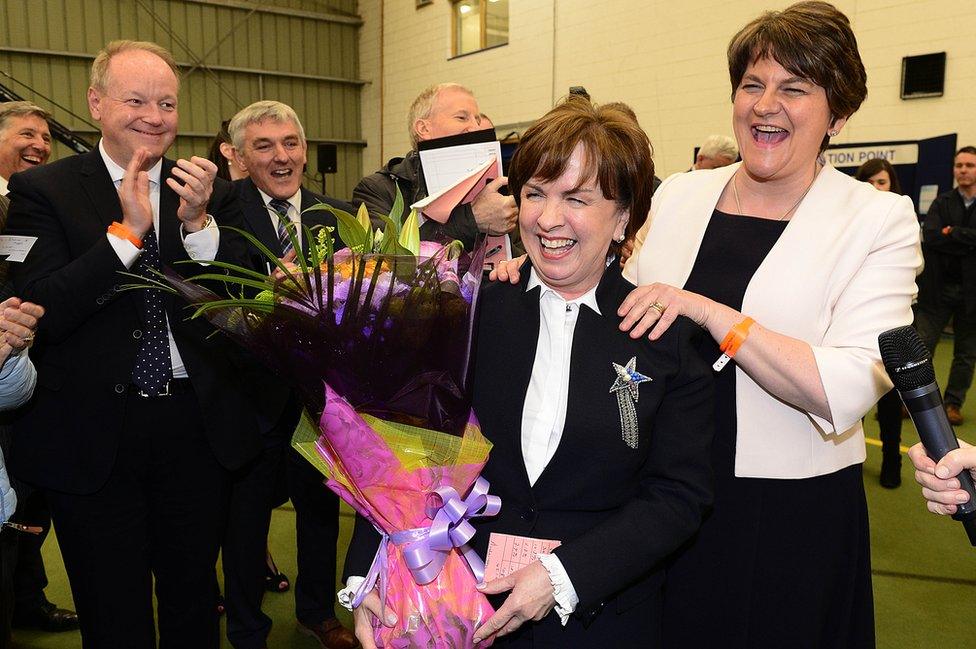
The DUP's Diane Dodds was the first to be elected, retaining the seat she has held since 2009
Her voice cracked with emotion as she thanked those who had elected her, saying they had sent a clear message that they wanted to remain in the EU.
"The people who voted for me came together from right across the community, regardless of unionism, regardless of nationalism, regardless of all those labels," she said.
Northern Ireland EU election count... in 70 seconds.
"I will serve them to the absolute best of my ability - they have my word on that."

Analysis: Jayne McCormack, BBC News NI political reporter
All three European seats for Northern Ireland have been taken by women for the first time ever, with counting wrapping up earlier than expected in Magherafelt.
The DUP's Diane Dodds was the first elected, but it was Alliance leader Naomi Long who exceeded expectations.
She took the second seat, and polled more than 170,000 votes, taking transfers from right across the spectrum.
The Ulster Unionists have some reflecting to do - they failed to retain the seat they've held for four decades, with Danny Kennedy only coming sixth.
Now the question is for how long the three successful candidates will be MEPs.

Eleven candidates were competing to become one of Northern Ireland's three members of the European Parliament (MEPs) in Brussels and Strasbourg.
The threshold to win election was 143,112 votes. Mrs Dodds, who secured her place after the third count, won a total of 155,422 votes, while Mrs Long and Ms Anderson were voted in on the fifth count.
Speaking after her election, Mrs Dodds said: "The Democratic Unionist Party is by far the strongest voice of unionism, that voice that unionists trust to defend the union, to deliver Brexit.
"I think there's a lot of anger and frustration among those people who voted in the 2016 referendum that their voice has not been heard and the political class has not been heard. So we need to get on and deliver Brexit, one that is good for Northern Ireland."
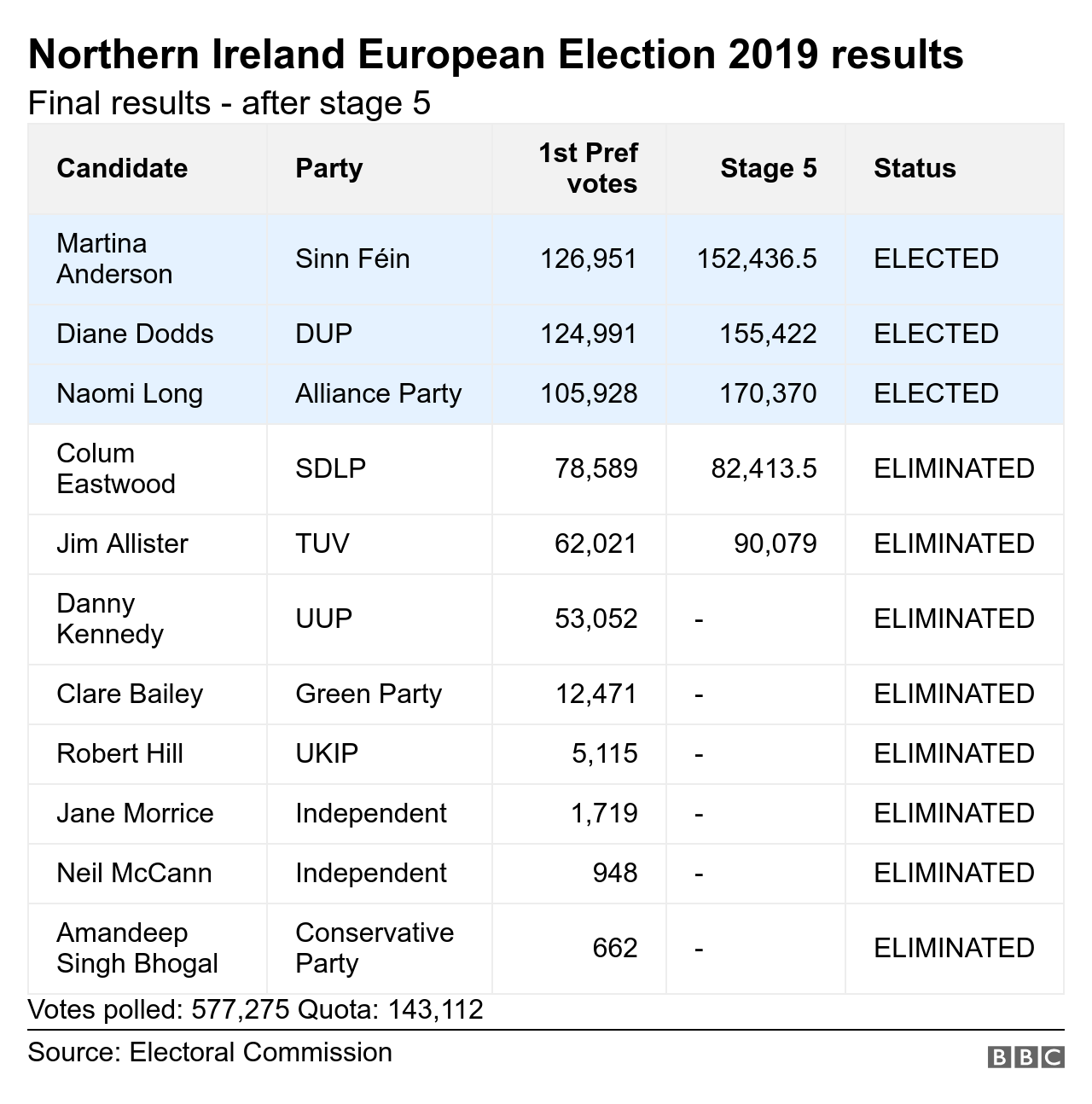
Ms Anderson won a total of 152,436 votes - 9,324 more than the quota required to be elected.
The Ulster Unionist Party (UUP) lost the European Parliament seat it had held since 1979 after its support plummeted by more than 30,000 votes on the total it received in 2014.
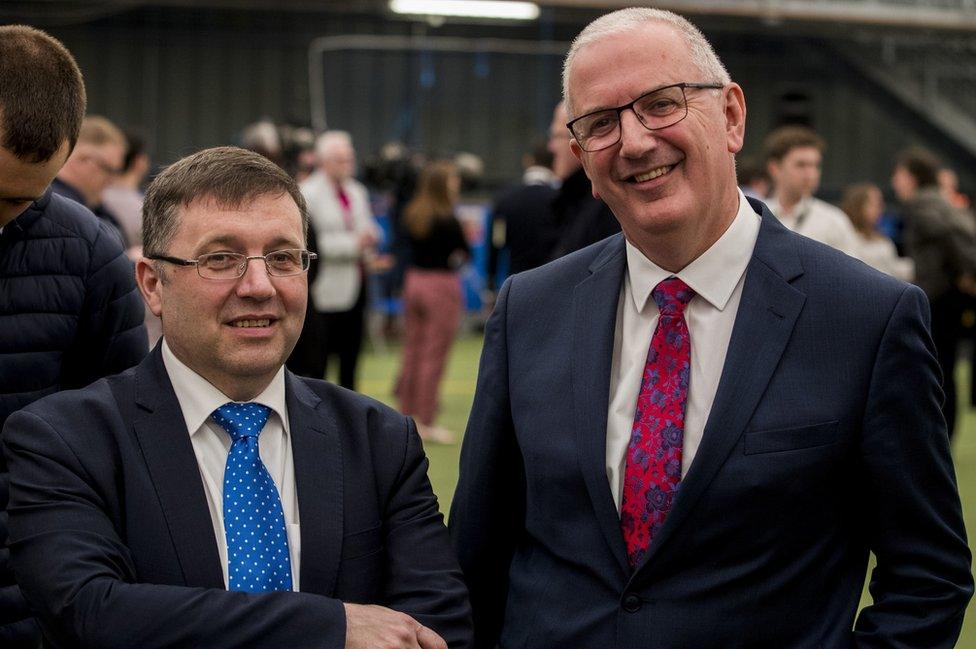
UUP leader Robin Swann (left) admitted disappointment after Danny Kennedy was eliminated
It limped in sixth in the first round, behind the leader of the Traditional Unionist Voice party Jim Allister, who accumulated a total of 90,079 votes over the five counts.
Its candidate Danny Kennedy was eliminated after the second stage of counting, with party leader Robin Swann admitting it was a "disappointing" day.
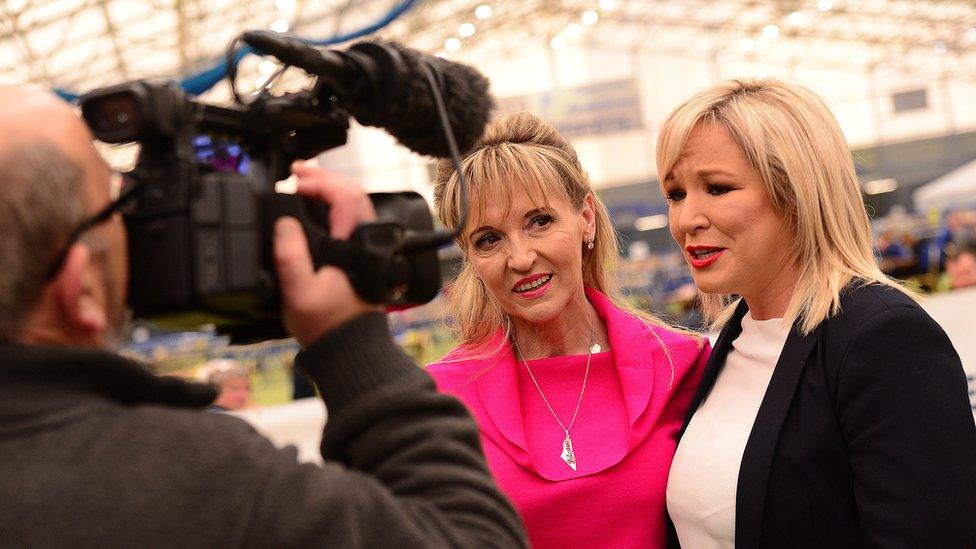
Martina Anderson - pictured with Sinn Féin vice-president Michelle O'Neill - received the most first-preference votes
After the elimination of Mr Kennedy - the sixth candidate to be excluded - the pro-Brexit DUP's Mrs Dodds passed the quota of 143,112 votes for election.
'Tactical voting'
Ms Anderson lost almost 33,000 first preference votes for Sinn Féin - she polled just under 160,000 in 2014 - but said she was happy with her result, putting her drop down to tactical voting by her supporters.
"Primarily, the strategy has about getting two Remainers over the line," said the anti-Brexit politician.
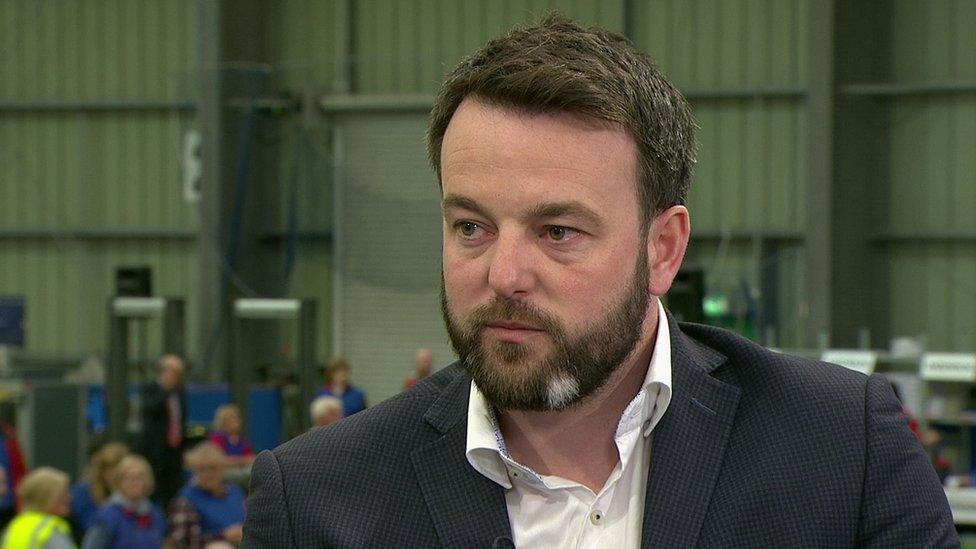
The SDLP leader Colum Eastwood was eliminated after the fourth stage of counting
"I've had republicans coming up to me and telling me: 'Look, you're safe and therefore we're going to vote tactically."
She added: "We wanted to send a message back to the EU by, in the first instance, topping the poll and, more importantly, sending two Remainers back.
"Fifty seven per cent of the people who voted here voted to remain in the EU and they have sent a strong message back to Europe that they want to stay in the EU."
SDLP leader Colum Eastwood was eliminated after the fourth stage of counting.
Lower turnout
Voters across the UK went to the polls on Thursday to decide who would represent them in the European Parliament.
Turnout was 45% of the 1,278,951 people eligible to take part, down on the 2014 election in which almost 52% eligible voters participated.
A total of 1,463 ballot boxes were used across Northern Ireland and transported to the election centre in Magherafelt, County Londonderry, where counting began on Monday morning.

Voter turnout dropped by more than 6% on the 51.84% who went to the polls in 2014
While the counting in the rest of the UK began on Sunday night, counting does not take place on Sundays in Northern Ireland - a long-standing arrangement due to the traditional observance by the region's Christian population of Sunday as a day of rest.
What happened in the previous European election?
Mrs Dodds of the DUP, Sinn Féin's Ms Anderson and Ulster Unionist Jim Nicholson were elected in the 2014 European Parliament poll.
Ms Anderson received the highest number of first-preference votes in that election - a total of 159,813 - while Mrs Dodds received 131,163.
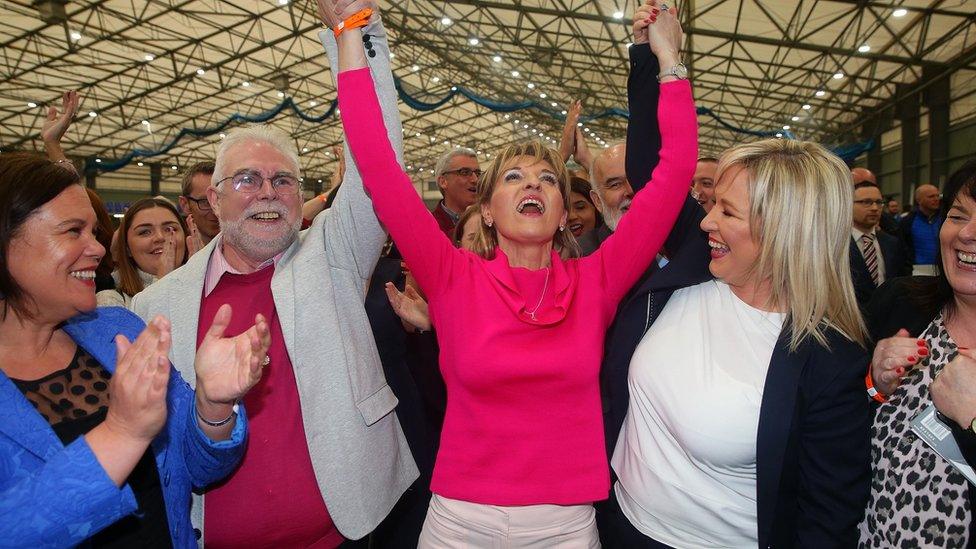
Ms Anderson said she was happy with her result
Mrs Dodds and Ms Anderson both stood to retain their seats in Thursday's poll but Mr Nicholson did not.
Instead Mr Kennedy, a former Stormont minister, was the candidate for the UUP.
How does the voting system work in Northern Ireland?
Northern Ireland uses a different voting system to the rest of the UK in the European election.
In the single transferable vote (STV) system, voters are able to rank the candidates in order of preference.
To make the system work, officials first need to calculate a quota.

TUV leader Jim Allister, who came in fifth place, marks down results during the declaration
They take the total number of valid votes cast, divide it by the number of seats available plus one and then add one.
In the first round, if any candidate secures more first-preference votes than the quota they are elected.
Surplus votes - those received above the quota - are redistributed among the other candidates.

Staff at the count centre in Magherafelt finished much earlier than expected
If not enough candidates have yet reached the quota, then the candidate with the lowest number of votes is eliminated and the lower-preference votes of their supporters are again reallocated.
That process is repeated until the three posts have been filled.
The Electoral Office for Northern Ireland recruited about 800 staff for the count at the Meadowbank Sports Arena in Magherafelt.
- Published27 May 2019
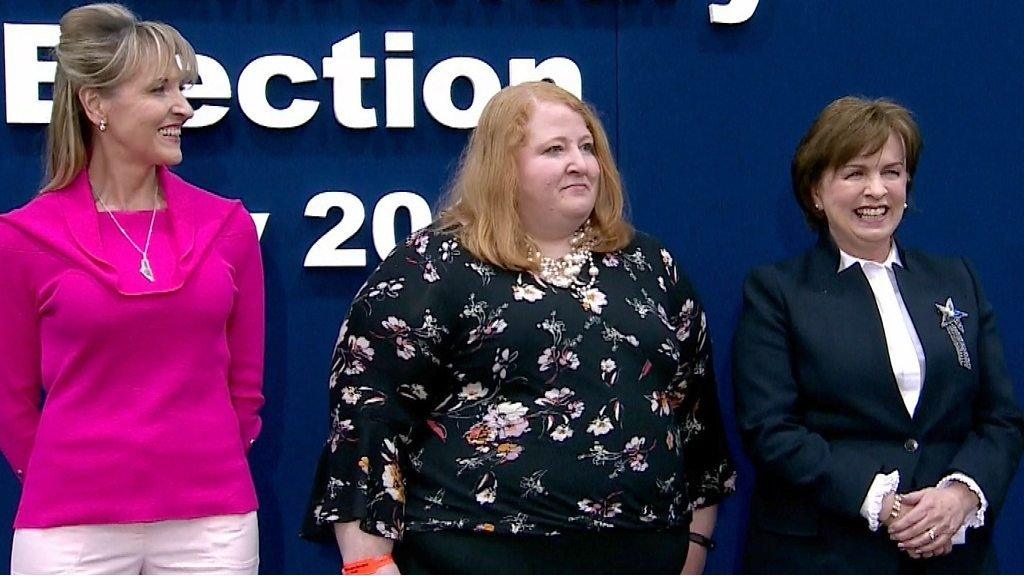
- Published27 May 2019
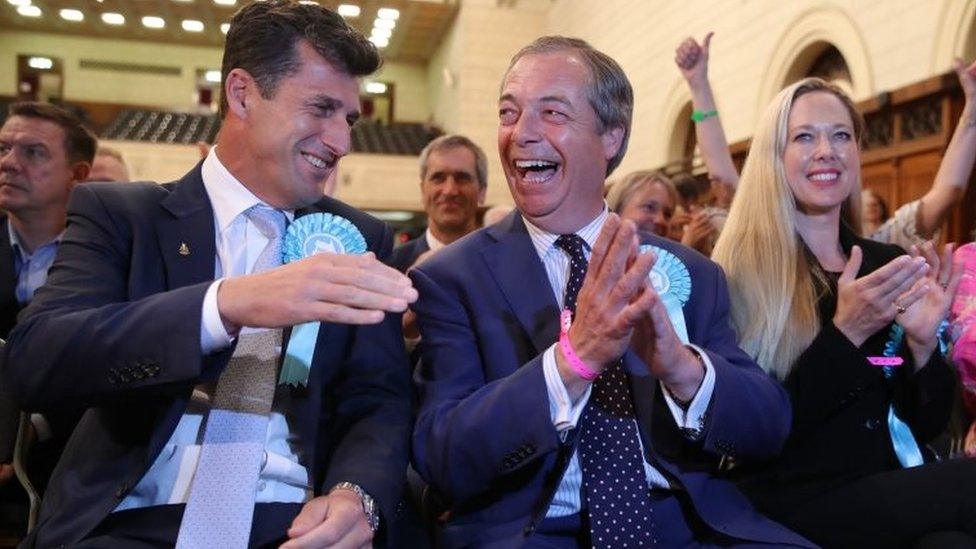
- Published11 April 2019
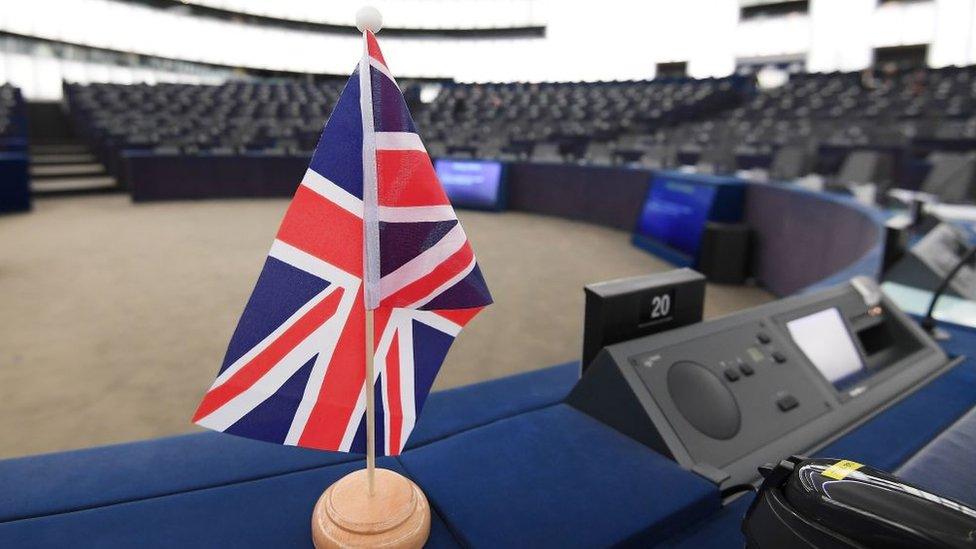
- Published7 May 2019
